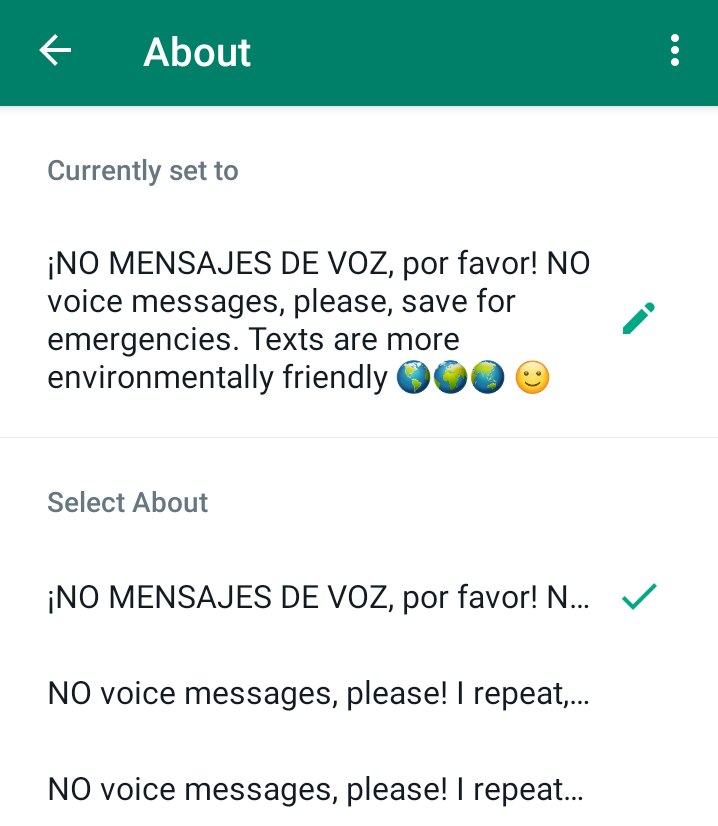Ingresa o regístrate acá para seguir este blog.
[Listen to an audio version of this blog entry here.]
‘Oh for feck sake, not another WhatsApp voice message.’
Through gritted teeth, that’s generally how I respond upon receiving a WhatsApp voice message.
The joy of text
The intensity of this indignation is directly proportional to the length of these “verbal vectors”. I’m terming them thus as there’s a good chance they are causing me mental harm owing to the ill feeling they generate in me.
If they are no more than thirty seconds in length and don’t turn into a verbal volley, then I can deal with them without getting too worked up. (I must also confess here, lest I be called a hypocrite, I have been known to send the odd one in certain circumstances. This, though, is very much the exception. For the most part, I text.)
The thing is, for a not-insignificant number of WhatsApp users the voice message is the default option. In terms of my contacts, it seems that Colombians in particular are big fans of them.
‘I find the idea of voice messages quite selfish. More effort is generally required from the recipient rather than the sender.’
Of course, this could simply be a reflection of those I engage with the most on WhatsApp; my bad luck. I can’t say with any certainty that most Colombians prefer voice messages to texts. Nor can I say that they are used more frequently here compared to other countries.
Whatever the case, despite my WhatsApp profile “About” blurb beseeching contacts not to send voice messages — I guess nobody reads what’s written in that section — they’re something I’m regularly “forced” to tackle.
So why do they rankle with me so much?
For starters, I find the idea of them quite selfish. More effort is generally required from the recipient rather than the sender. Basically, the latter expects the former to listen to a monologue that on occasions can be akin to a mini-podcast in terms of length.
(Just to be clear — lest the hypocrisy charge be levelled at me again — when I send a blog story or podcast or whatever, I’m not demanding that the recipient engages with the content. That’s, obviously enough, up to the individual. It’s quite different with voice messages.)
At least with a written message it can usually be glanced over to see if it requires “urgent” attention without even entering the application. This can’t be done with a voice message. One either has to stop everything one is doing to listen to what was sent or ignore the audio for a time. I usually do the latter.
Vanquishing the voice message
You see, tied in with this is the fact that I use my phone for other audio purposes i.e. listening to podcasts/radio and watching YouTube. I also use it to read books. Voice messages are a greater distraction for all these activities than written messages. Hence the wrath.
In mild mitigation, as a society, we’re still trying to settle on a widely accepted etiquette for social media interaction and the like. What one person views as a great innovation is an utter annoyance to another — see, as a further example on a related theme, my previous piece railing against an ever-encroaching Big Tech.
In terms of social media specifically, however, most mental health experts would agree that the best strategy is to use them very sparingly, if at all (see Facebook, Instagram: Killing us softly).
Nonetheless, WhatsApp has now become the chief means of communication for many people. In my line of work, I’d be putting myself at a significant financial disadvantage by not having the app.
As I’ve said before, such things are merely tools that we must control. We shouldn’t let them control us. Yet, it’s beyond my control if somebody sends me a WhatsApp voice message.
So surely the brains behind WhatsApp could introduce a version without the voice-message facility or at least have an option inhibiting the ability to receive them, with this clearly displayed for any would-be voice-message sender?
Come on Mr Zuckerberg, you’ve done far worse to the world. Just when you do roll this out, I want my cut.
_______________________________________________________________
Listen to Wrong Way’s Colombia Cast podcast here (https://anchor.fm/brendan-corrigan).
Facebook: Wrong Way Corrigan — The Blog & IQuiz “The Bogotá Pub Quiz”.



